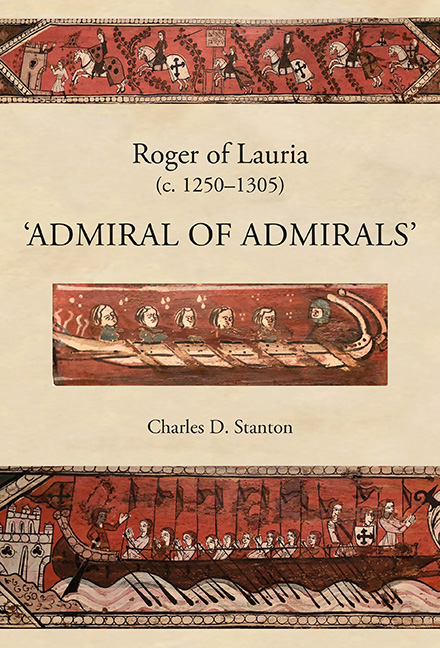Book contents
- Frontmatter
- Dedication
- Contents
- List of Illustrations
- Prologue
- 1 Battle of Benevento (26 February 1266)
- 2 A Calabrian Exile in the Court of Aragon (1262–1282)
- 3 Battle of Tagliacozzo (23 August 1268)
- 4 Aragonese Expansion (1229–1282)
- 5 Angevin Consolidation and Aggrandizement (1268–1282)
- 6 Revolt of the Vespers (30 March 1282)
- 7 Aragonese Intervention (August–October 1282)
- 8 Stalemate (November 1282–March 1283)
- 9 Admiral of Aragon (20 April 1283)
- 10 The Opposing Fleets (1282–1302)
- 11 Battle of Malta (8 June 1283)
- 12 Anjou's Dreams of Empire Dashed (June–November 1284)
- 13 France's Crusade Against Aragon (May–November 1285)
- 14 Battle of the Counts (23 June 1287)
- 15 Truces and Treaties (June 1287–November 1291)
- 16 Raid on Romania (Summer 1292)
- 17 Switching Sides (December 1293–April 1297)
- 18 Aragon's Invasion of Sicily at Anjou's Bidding (1298/1299)
- 19 Lauria's Last Great Campaign (Summer 1299–Spring 1300)
- 20 Endgame (Spring 1301–Summer 1302)
- Epilogue
- Bibliography
- Index
3 - Battle of Tagliacozzo (23 August 1268)
Published online by Cambridge University Press: 24 October 2019
- Frontmatter
- Dedication
- Contents
- List of Illustrations
- Prologue
- 1 Battle of Benevento (26 February 1266)
- 2 A Calabrian Exile in the Court of Aragon (1262–1282)
- 3 Battle of Tagliacozzo (23 August 1268)
- 4 Aragonese Expansion (1229–1282)
- 5 Angevin Consolidation and Aggrandizement (1268–1282)
- 6 Revolt of the Vespers (30 March 1282)
- 7 Aragonese Intervention (August–October 1282)
- 8 Stalemate (November 1282–March 1283)
- 9 Admiral of Aragon (20 April 1283)
- 10 The Opposing Fleets (1282–1302)
- 11 Battle of Malta (8 June 1283)
- 12 Anjou's Dreams of Empire Dashed (June–November 1284)
- 13 France's Crusade Against Aragon (May–November 1285)
- 14 Battle of the Counts (23 June 1287)
- 15 Truces and Treaties (June 1287–November 1291)
- 16 Raid on Romania (Summer 1292)
- 17 Switching Sides (December 1293–April 1297)
- 18 Aragon's Invasion of Sicily at Anjou's Bidding (1298/1299)
- 19 Lauria's Last Great Campaign (Summer 1299–Spring 1300)
- 20 Endgame (Spring 1301–Summer 1302)
- Epilogue
- Bibliography
- Index
Summary
IF MANFRED HAD TRULY been the last Hohenstaufen heir standing, then Benevento might have been the last battle that Charles of Anjou needed to fight to secure his kingdom; and perhaps the Crown of Aragon would never have had cause to intervene at the urging of the Regno's refugees. After all, Anjou's victory had, in a solitary stroke, virtually vanquished the Hohenstaufen hierarchy in the Mezzogiorno. Manfred's wife, Queen Helena, her daughter Beatrice and three bastard sons had been incarcerated in the Castello del Parco of Nocera; and all Ghibelline resistance had been cowed into conformity. Most of the kingdom's towns and territories, including Sicily, had submitted without a struggle. Even Manfred's formidable fleet surrendered docilely. Charles had assuaged much of the opposition's animus by offering a general amnesty, of which even such staunchly loyal Hohenstaufen supporters as the Lancias had availed themselves, albeit following a brief imprisonment. But, of course, Manfred was not the last of his line: his nephew Conradin was not only alive and safe with his mother, Elizabeth of Wittelsbach, under the protection of his uncle, Duke Louis II of Upper Bavaria, but he was also approaching maturity. He would be at the core of a cascade of challenges to Charles's rule that would eventually usher on stage the Aragonese admiral who would prove to be Anjou's undoing.
Forced vows of faithfulness notwithstanding, the campaign to wrest the crown of Sicily from Charles of Anjou and place it on Conradin's head began bare months after Benevento. And at its heart was the House of Lancia. Galvano, the family patriarch and King Manfred's uncle, had been a Hohenstaufen adherent since before Emperor Frederick II had made him justiciar of Sicily in 1240. He was prominent among a number of Ghibelline loyalists who made their way to Bavaria in the summer of 1266. There was also Conrad Capece who had been Manfred's vicar for Sicily, soon followed by Conrad of Antioch, the son of Frederick of Antioch who was Manfred's half-brother. Even Manfred of Maletta, the king's former chamberlain whose steadfastness had been suspect, crossed the Alps in hopes of convincing Conradin to claim his crown. But it was Galvano di Lancia along with his brother Frederick who would become critical to rousing martial support for the undertaking.
- Type
- Chapter
- Information
- Roger of Lauria (c.1250–1305)‘Admiral of Admirals’, pp. 36 - 47Publisher: Boydell & BrewerPrint publication year: 2019



